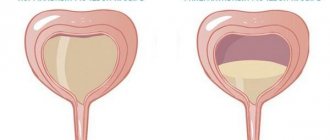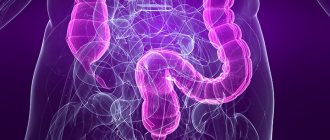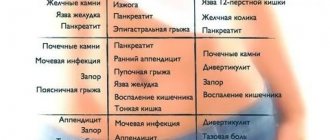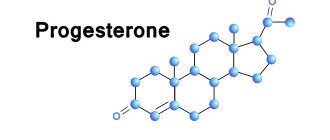Absolutely all people know the feeling of nausea. As a rule, it is accompanied by unpleasant sensations in the upper third of the stomach, in the center of the chest, as well as in the oral cavity (may be accompanied by burning and bitterness). Even despite such a set of unpleasant sensations, nausea does not go away at the level of sensations, but is accompanied by very real excess salivation, severe dizziness, and general weakness.
During nausea, blood pressure drops sharply and the person begins to turn pale.
GASTRITIS AND ULCER DISEASE
Symptoms
: Nausea worsens after eating, as does bloating or heaviness in the stomach, heartburn. Pain or burning sensation in the upper abdomen on an empty stomach and after eating.
Treatment:
Gastroscopy, general and biochemical blood tests, as well as a test for antibodies to the bacterium Helicobacter pylori, which causes ulcers. You will also need an ultrasound of the abdominal organs. You may be prescribed antibiotics. In any case, you have to change your eating style - not to get carried away with spicy, fatty and other non-dietary foods.
Why do you feel sick in the evening?
Nausea in the evenings (causes in women are often associated with functional disruptions of the endocrine system) appears as a result of:
- formation and development of the fetus in the first trimester of pregnancy, during which there is suppression of cellular immunity, which leads to an increase in the level of leukocytes and the death of phagocytes (these processes have a detrimental effect on the vomiting center of the brain);
- increased acidity in the gastrointestinal tract due to malnutrition or impaired digestion;
- nervous or physical exhaustion;
- oxygen starvation (hypoxia);
- frequent exhausting diets (lack of nutrients and their increased consumption by the fetus cause exhaustion of the body);
- high natural emotionality (hormonal fluctuations, intoxication with products of incomplete breakdown of food, phagocytes).
I often feel sick in the evening due to giving up an active lifestyle and bad habits. A woman painfully experiences the faded interest of her usual surroundings, limited opportunities for self-realization, and exaggerates the loss of attractiveness in the future due to changes in her figure.
Nausea in the evenings due to nervous tension in women (psychogenic nausea) – 70% of all cases.
Systematic use of antidepressants leads to disruption of the development of the fetal central nervous system and increases the likelihood of miscarriage due to a sharp decrease in estradiol production. In addition, sedatives lower a woman's blood pressure.
The result is bradycardia, decreased tone of blood vessels and intestinal smooth muscles. After which, the flow of nutrients into the blood decreases, putrefactive processes accelerate, as toxins continue to flow with increased intensity, nausea intensifies, and the periods between vomiting are reduced, which leads to dehydration of the body, destruction of bone tissue, reactive inflammatory processes, autoimmune and immune diseases. The only way out is to stay positive.
GALLBLADDER DISEASES
Symptoms
: Begins to feel nauseous even while eating, a feeling of fullness appears. It hurts closer to the right hypochondrium. Bitter or metallic taste in the mouth, heartburn, increased gas formation.
Treatment:
First, ultrasound, and then, depending on the diagnosis: it could be dyskinesia of the gallbladder, the presence of stones in it, cholecystitis (inflammation of the gallbladder). At the same time, it is advisable to check the liver - these organs closely interact. Treatment ranges from antibiotics to surgery to remove the gallbladder.
INTESTINAL INFECTION, POISONING
Symptoms
: Some time after eating, nausea increases and almost always ends with vomiting. Weakness, headache and pain in the upper abdomen in the navel area. Sometimes the temperature rises to 37–39° C. Over time, diarrhea occurs.
Treatment:
If you suspect what exactly you were poisoned with, and no more than 2 hours have passed, drink 2-3 glasses of warm water in small sips and induce vomiting. Then begin to replenish fluid loss (water, light tea, fruit juice). You can take 2-4 tablets of activated carbon. If the vomiting does not stop, bile appears in it, and you feel dizzy, it is better to call an ambulance - this could be a serious infection like salmonellosis.
PROBLEMS WITH THE VESTIBULAR APPARATUS
Symptoms
: Nausea and dizziness occur suddenly when you change the position of your body and head (for example, turning over on your other side in bed, standing up suddenly).
Additional symptoms
: loss of balance, tinnitus or nystagmus (when following an object, the eyes cannot stay on it, the gaze slides off).
Treatment:
Contact an ENT specialist and a neurologist. This may be damage to the auditory or vestibular system - for example, Meniere's disease. It is quite unpleasant, but not dangerous and can be successfully treated.
HYPERTENSION
Symptoms
: Nausea throughout the day, especially in the morning. You get tired quickly, your head often hurts or feels dizzy, and in the morning your face is a little swollen, sometimes red.
Treatment:
Go to a therapist or cardiologist and measure your blood pressure after a five-minute rest. Most likely, the doctor will prescribe medications that will need to be taken constantly.
| AGE, years | BLOOD PRESSURE, mm Hg. (norm) |
| 16-20 | 100/70-120/80 |
| 20-40 | 120/70-130/80 |
| 40-60 | Up to 135/85 |
| Over 60 | Up to 140/90 |
When does nausea occur during pregnancy?
Nausea mainly appears at 3 weeks. The body begins to react negatively to the development of the fetus. If the mother's body is hypersensitive, nausea may occur on days 3-9.
Nausea in the evening, the cause of which in women is an autoimmune disease, regardless of the form of the stage or chromosomal incompatibility of the fetus with the maternal body, occurs during the period of greatest fatigue, immune destabilization from 17:00 to 22:00. The frequency and time of occurrence of nausea depend on the individual characteristics of the mother’s body. Nausea more often in the morning.
The reasons for the discomfort also differ. The main cause of morning sickness is irritating odors. The sensitivity of the mother's body increases due to toxicosis and increased release of histamine, as a mitigating factor during hormonal changes. If histamine is released in insufficient quantities, the load on the cardiovascular system and kidneys increases. Consequently, the heartbeat accelerates, arterial and intracranial pressure increases, which can lead to rupture of blood vessels or heart muscle (heart attack, stroke). These conditions are preceded by severe nausea, vomiting, and redness of the eyes.
INFARCTION, HEART FAILURE
Symptoms
: Nausea is persistent, sometimes to the point of vomiting. Pain has appeared and is growing in the upper abdomen, in the pit of the stomach. Possible hiccups, a feeling of stuffiness, and pallor.
Treatment:
It is best to call an ambulance or immediately go to a cardiologist and ask for a control ECG. Especially if you are over 45–50 years old, have just experienced physical or emotional stress, or have recently complained of discomfort in the heart and pain radiating to the left arm and lower jaw.
INFLAMMATORY PROCESS IN THE KIDNEYS
Symptoms
: Nausea is not associated with food, temperature up to 38–40 ° C, sometimes vomiting. Pain (aching, dull or paroxysmal) in the lower back (less often in the abdomen), chills. Possible urination problems.
Treatment:
Consultation with a therapist, nephrologist, urologist. For acute symptoms, it is better to call an ambulance. There will be general and special urine tests, general and biochemical blood tests, ultrasound of the kidneys and other organs of the urinary system. You will need a diet and a course of medications, including antibiotics, if the inflammation is caused by an infection. Sometimes surgery is needed.
Nausea and headache
Most often, gastric disorders are accompanied by pain in the abdomen, but it can also be felt in the head. This combination of symptoms often indicates problems with the nervous system and brain. Often the situation is associated with psycho-emotional stress, which aggravates the problem. One of the common causes of nausea that is accompanied by headache is migraine.
Although almost any disease occurs differently in each person, taking into account individual characteristics, migraine has an extremely diverse clinical picture. Experts still cannot identify clear factors of its occurrence, and therefore an effective treatment has still not been found. Doctors agree that migraine attacks are accompanied by:
- Tormenting headaches
- Nausea,
- Phonophobia,
- Depressed mood
- Drowsiness or agitation.
The clinical picture further varies depending on whether the woman suffers from migraine with or without aura. Attacks of the disease can pass in less than an hour, or can last several days. Since intestinal motility worsens during an exacerbation, painkillers in tablet form have no effect on the patient.
Note! As a rule, over time, everyone finds their own way of dealing with the problem, but in some cases nothing helps the patient and he can only wait until the attack is over.
Migraine is not the only disease that causes nausea with headache. A similar clinical picture is observed with strokes, concussions and traumatic brain injuries. Sometimes symptoms are triggered by high blood pressure or infection. Rarely, manifestations indicate meningitis or a brain tumor. It is impossible to identify such problems on your own. You need to see a doctor and get diagnosed.
We recommend reading: Eutirox: instructions, indications, dosages and analogues, reviews
5 MORE POSSIBLE CAUSES OF NAUSEA
1. Side effects of medications.
Any medicine can be to blame, but more often than others – non-steroidal anti-inflammatory drugs, antibiotics, and iron supplements. 2. Pregnancy. As a rule, nausea subsides after 12–13 weeks. But in women, besides pregnancy, there may be other causes of nausea. 3. Migraine. Silence, darkness and a triptan drug, which should be prescribed by a neurologist, will help relieve the attack. 4. Concussion. If nausea does not go away or worsens, or constant dizziness occurs, call an ambulance. 5. Meningitis. If you feel very sick to the point of vomiting, your temperature has risen to 38–40° C, photophobia has appeared, your neck muscles are tense, call an ambulance as soon as possible. Olga Pisareva - http: //zdr.ru/ Save on social networks:
Nausea after eating
The causes of nausea in women after eating are almost always associated with problems in the digestive organs. Except in cases where an unpleasant symptom arose against the background of severe overeating, one should suspect one of the gastrointestinal diseases. Usually a woman feels not only nausea, but also pain. By the moment and nature of its occurrence, one or another disease can be suspected.
For example, pain while eating suggests pathologies of the gallbladder or liver. As a rule, the syndrome is localized in the right side of the abdomen. Also, some women complain of bitterness in their mouth. If the patient describes girdle pain after eating, this may indicate pancreatitis. In cases where nausea is observed not only after eating, but also before it, doctors may suspect hypothyroidism. However, this disease has many associated symptoms, including:
- Chills,
- Active weight gain
- Decreased appetite.
If some time passes from the moment of eating to the onset of nausea, then the cause may be hidden in an infection that has affected the intestines. Such diseases are also accompanied by a variety of symptoms, including loose stools, fever, abdominal pain, and sometimes vomiting. If nausea occurs several times during the day, this may indicate a heart attack.
When an unpleasant symptom occurs only once, it is worth thinking about potentially non-dangerous causes. In addition to overeating, nausea can occur from the unpleasant smell or taste of food, as well as from the use of medications. Problems arise during active exercise after a heavy meal. Morning nausea in women after eating is often associated with pregnancy. There is also always the possibility that the cause lies in psychological disorders.











